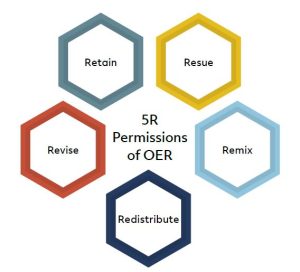Why OER?
Unique characteristics of OER
OER include resources in any format (video, textbook, lesson plans etc.), which are:
- openly licensed, using for example Creative Commons licensing,
- and those which are in the Public Domain (which are no longer within copyright).
Therefore OER are not subject to the same restrictions as other teaching and learning materials which means that they can be widely used, adapted and reused. The rights afforded by OER to users are known as the 5Rs, as they empower users to:
Retain – make, own, and control a copy of the resource (e.g. download and keep your own copy)
Revise – edit, adapt, and modify your copy of the resource (e.g. translate into another language)
Remix – combine your original or revised copy of the resource with other existing material to create something new (e.g. make a mashup or a collection)
Reuse – use your original, revised, or remixed copy of the resource publicly (e.g. on a website, in a presentation, in a class)
Redistribute – share copies of your original, revised, or remixed copy of the resource with others (e.g. post a copy online or give one to a friend)[1]

Image credit: 5R permissions of OER snipped from Go open: a beginners guide to open education by Farrell, O. et al. CC BY 4.0
The National Forum has produced a very useful open licensing toolkit, which provides very practical advice on how creative commons (CC) licenses can be used to create OER. Similarly, McMaster University, Canada, provide a very concise and informative overview of creative commons and other open licensing options.
Advantages of OER
Potential advantages of OER are well documented and are succinctly summarised by Jhangiani et al.[2]:
- reducing economic barriers
- equity and inclusion
- accessibility and data privacy
- participatory learning and student engagement
- pedagogical flexibility and innovation
- student enrolment, persistence, and performance
- alignment with institutional mission and strategy
Thus, OER has the potential to be a flexible, sustainable resource utilised by higher education in Ireland to enhance student experience and diversify curriculum resources.
- Section 1.2 Open Educational Resources (OER) of Using OER and OEP for Teaching and Learning by the National Forum for the Enhancement of Teaching and Learning. Available at: https://open.teachingandlearning.ie/oer/ CC BY 4.0. ↵
- Jhangiani, R., Farrelly, T., Ó Súilleabháin, G. (2024) Open Education Practices in Higher Education: Focusing on Responsiveness, Innovation & Inclusivity. N-TUTORR. ISBN: 978-1-7395019-2-1 Available at: https://www.transforminglearning.ie/publications/open-education-practices-in-higher-education ↵

